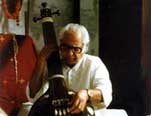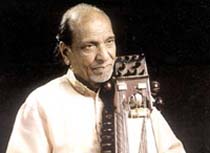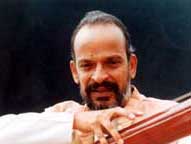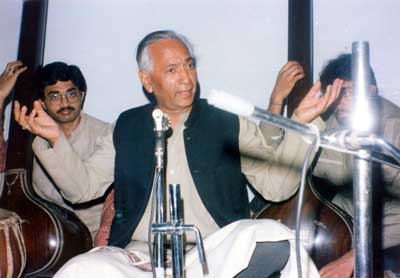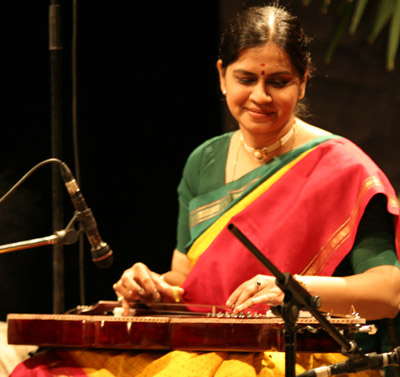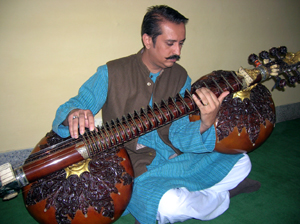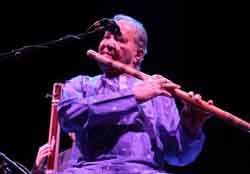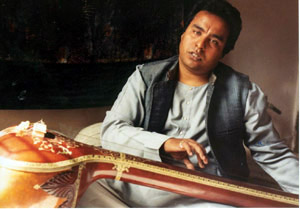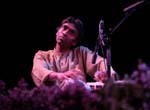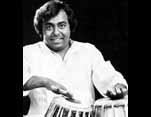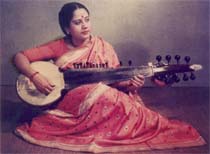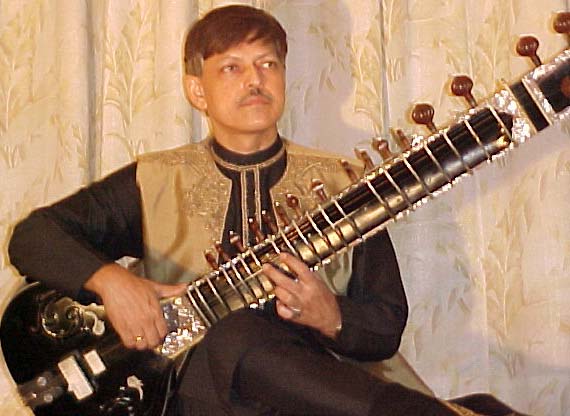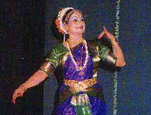Understanding of Indian music and Indian culture it is necessary to understand the Indian thinking as well. Here you can find some interviews which help to undestand the cultural tradition of India and even you can read and listen to about the personal story of great Indian performers.
|
Ustad Rahim Fahimuddin Dagar was born in Alwar in Rajasthan in the year 1927. Initiated into the art of dhrupad singing by his elders, he is now the foremost as well as the seniormost representative of the tradition of his family. Even at the age of 78, he continues to perform and impart his knowledge to deserving students. interview by: Irfan Zuberi |
|
Ustad Sabri Khan is a representative of the Moradabad Gharana of sarangi playing. He has the distinction of being an accomplished accompanying artist as well as a brilliant solo performer. Even at the age of 78, he continues to give solo recitals and teach students instrumental as well as vocal music. interview by: Irfan Zuberi |
|
Pandit Rajshekhar Mansur is not only the son of the legendary Pandit Mallikarjun Mansur of the Jaipur Gharana of khyal but also a very talented creative vocalist in his own right. interview by: Irfan Zuberi |
|
The son of the legendary Pt. Krishnarao Shankar Pandit and is currently the seniormost representative interview by: Irfan Zuberi |
|
Dr. Kamala Shankar was born in a noble family in Tamil Nadu. Started to learn vocal music and later on she became the first guitar artist of the Imdad Khani Gharana, innovator a new style of guitar, called shankar-guitar. You can listen her live concert at Tilos Radio (Hungary) as well. interview by: Tóth Szabi |
|
Gundecha Brothers received conventional university education and learned the Dhrupad vocal art under the renowned Dhrupad vocalist Ustad Zia Fariduddin Dagar and also with Ustad Zia Mohiuddin Dagar (the distinguished performer of Rudra-Vina) in Dhrupad Kendra, Bhopal. interview by: Tóth Szabi |
|
He is a representative of the 20th generation of the Dagar tradition with his instrument, the rudra-vina, which is one of the most ancient instrument of India. His father, the legendary Zia Mohiuddin Dagar was an innovator of the instrument, who made the vina a well known instrument all over the world. interview by: Tóth Szabi |
|
Pandit Hariprasad Chaurasia is one of the most famous Hindustani musicians of our time. An open hearted musician who is not only the player, but the innovator of the ancient Indian instrument, the bansuri. The interview is downloadable in video format (DivX) as well. interview by: Tóth Szabi |
|
|
He is a representative of the 20th generation of the Dagar tradition as a vocalist. His father and his uncle had a world famous musical duet, called the Dagar Brothers. interview by: Tóth Szabi |
|
Brabhu Edouard was born in an Indo-French family and became the disciple of the legendary tabla maestro, late Pandit Shankar Ghosh. Played as an accompainist such giants of Hindustani music, like Pandit Hariprasada Chaurasia, Aashish Khan, or Lakshmi Shankar. The interview starts with a live tabla solo at Tilos Radio (Hungary). interview by: Tóth Szabi |
interview Tabla solo |
|
Sudeshna Bhattacharya is winner of many titles and gold medals of music, a disciple of the famous sarod maestro Amjad Ali Khan, about the history of the sarod and about her personal journey as a musician. You can listen to Sudeshna Bhattacharya’s radio-concert (Raga Gujari Todi) as well, accompained by Peter Szalai on tabla. interview by: Tóth Szabi |
|
Pandit Charanjit Lal, son of the fantastic tabliya Chatur Lal, who is not only an excellent player but running the Chatur Lal Memorial Society he is trying to keep alive his father’s memory and the Indiai classical music as well. interview by: Tóth Szabi |
|
As called in India: Sarod Rani, means Sarod-Queen who is a great maestro of the Maihar Gaharana, interview by: Tóth Szabi |
|
Interview with Pandit Vinode Pathak, a unique tabla player, whose family’s musical lineage is hundreds years old. interview by: Tóth Szabi |
|
Pandit Budhaditya Mukherjeec is an excellent sitar player of our time: From the interview you can also learn, what the the Hindustani music is based on. interview by: Tóth Szabi |
|
Interview with Anuradha Shinde a Bharata Natyam dance teacher of the famous Kalakshetra Academy of Madras (Chennai). interview by: Tóth Szabi |
